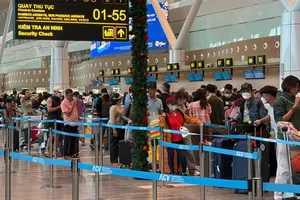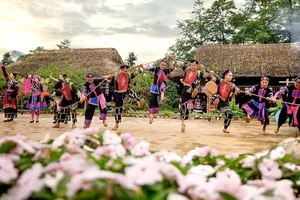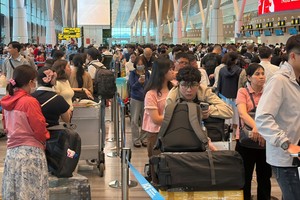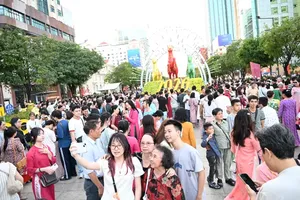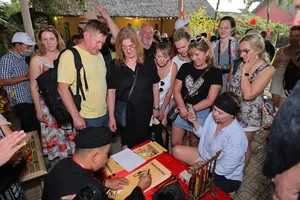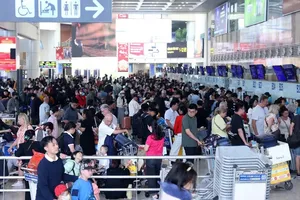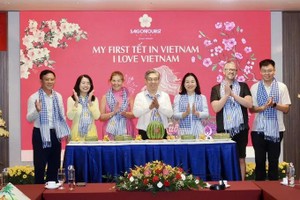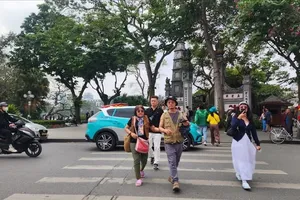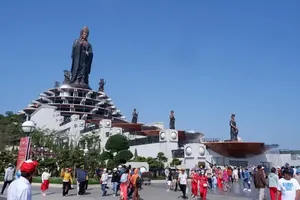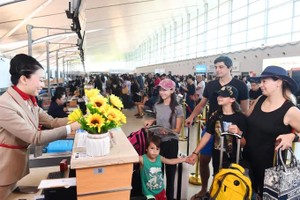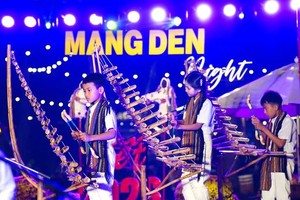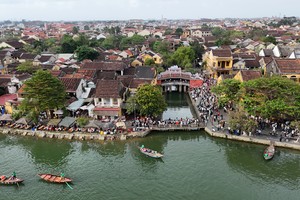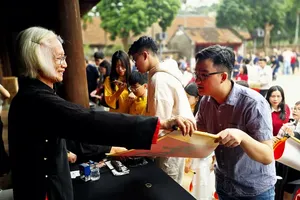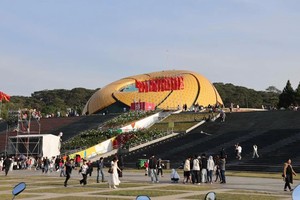The Yen Tu Festival- one of the country's annual biggest spring festivals in the northern region opened at Truc Lam Yen Tu Buddhist Zen Monastery in the complex is usually so packed and noisy with a huge number of pilgrims and tourists. This year, because of the Covid-19 pandemic, the number of visitors reduce significantly. Visitors can move around freely and enjoy the grandiose mountain landscape and a wonderful experience in the silence across the holy land.
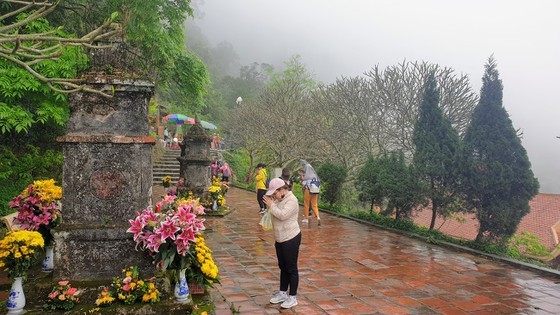
To date, the Yen Tu Monuments and Landmarks Complex received more than 34,000 travelers after the reopening from March 11. The number accounts for one out of every ten during the same period in previous years.
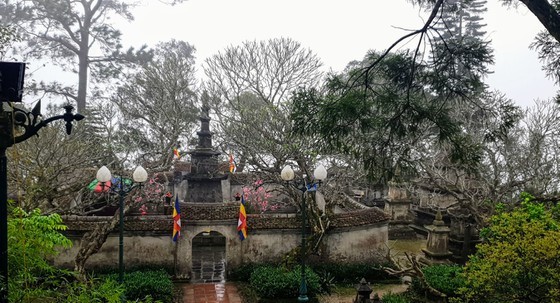 A space for the contemplation of a sacred silence on Yen Tu Mountain
A space for the contemplation of a sacred silence on Yen Tu Mountain
Director of Tung Lam Development Joint Stock Company, Le Trong Thanh said that the cable car system which connects Bac Giang Province to Yen Tu Mountain in Quang Ninh Province usually has to be operated at maximum capacity to meet the increasing demand of tourists every year. However, the system is less than half of its usual capacity due to a big drop in visitors even on weekends.
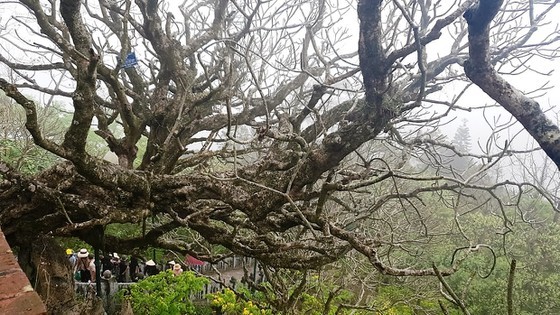 700 year-old lei tree (also known as temple tree, frangipani or Plumeria plant) in Hoa Yen Pagoda
700 year-old lei tree (also known as temple tree, frangipani or Plumeria plant) in Hoa Yen Pagoda
The infection prevention and control measures have been strictly implemented to limit the entry and spread of the coronavirus during the festival in the historical site.
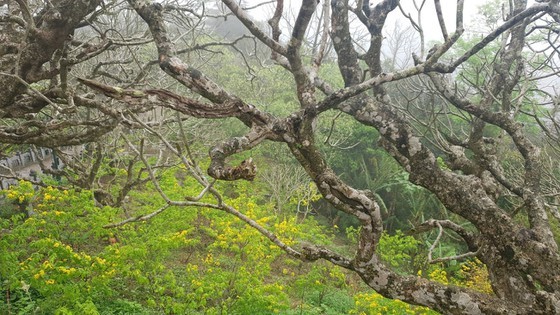 Yen Tu yellow apricot trees come into bloom.
Yen Tu yellow apricot trees come into bloom.
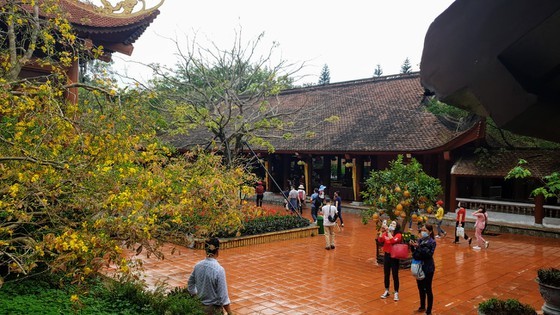 Yellow apricot trees bloom in Yen Tu primary forest in spring, giving off a fresh and pure scent. (Photo: SGGP)
Yellow apricot trees bloom in Yen Tu primary forest in spring, giving off a fresh and pure scent. (Photo: SGGP)
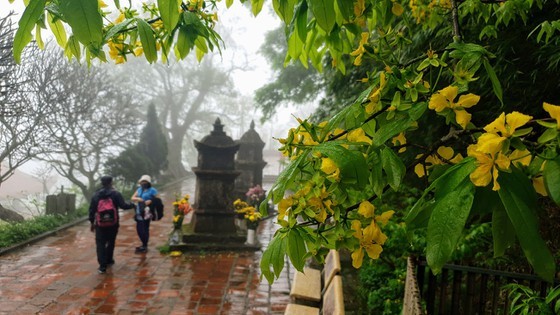 Apricot blossoms are in full bloom brilliantly in the second lunar month. The season lasts for around a month.
Apricot blossoms are in full bloom brilliantly in the second lunar month. The season lasts for around a month.
Head of the Management Board of the Yen Tu Relic and National Park, Le Tien Dung said that the local volunteer force always available at entrances and in pagodas to remind people of strictly implementing prevention measures, such as wearing a face mask and maintaining social distancing.
Covid-19 monitoring and control stations will be established at entrances of the complex to ensure that all people strictly implement prevention measures, such as measuring body temperature, submitting direct and online health declaration forms before entering the historical site.
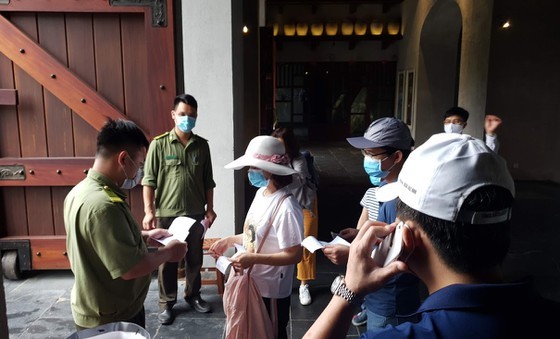 This year's number of tourists accounts for one out of every ten during the same period in previous years.
This year's number of tourists accounts for one out of every ten during the same period in previous years.
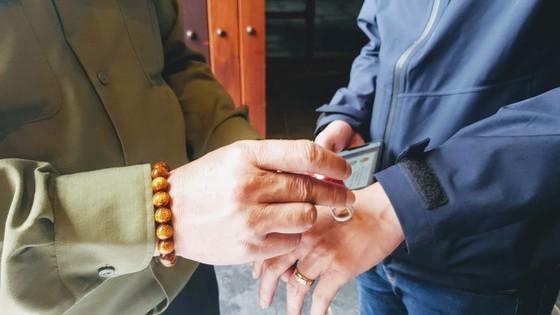 After taking Covid-19 check-in procedures, visitors will get a Bodhi-leaf shaped stamp on hand.
After taking Covid-19 check-in procedures, visitors will get a Bodhi-leaf shaped stamp on hand.
The Yen Yu historical site has implemented 200-meter distance rule for vehicles, a required 20-meter distance rule for groups of 20 people and more, the physical distance for social distancing at 2m, a ban on gatherings of more than 20 people. Electrical vehicles and cabins in the cable car system have been allowed to operate at no more than 50 percent of their capacity.
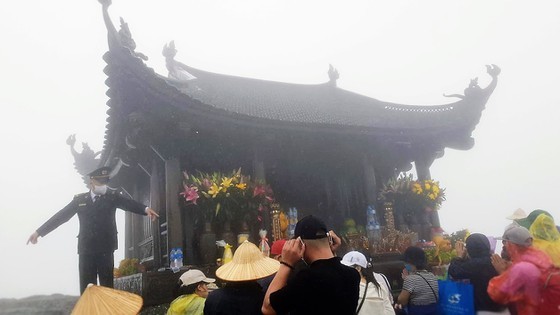 A dossier of the complex of Yen Tu monuments and landscapes has been compiled to submit to UNESCO for recognition as a World Cultural Heritage.
A dossier of the complex of Yen Tu monuments and landscapes has been compiled to submit to UNESCO for recognition as a World Cultural Heritage.
Yen Tu Monuments and Landmarks Complex, about 120km away from Hanoi, stretching over three provinces of Bac Giang, Hai Duong and Quang Ninh includes sectors of the historical relics and natural landscape of Yen Tu mountain and the historical site of the Tran Dynasty in Quang Ninh, the natural conservation area of West Yen Tu in Bac Giang, and the special national relic site of Con Son – Kiep Bac and Thanh Mai Pagoda in Hai Duong.
Yen Tu Festival usually opens at Truc Lam Yen Tu Buddhist Zen Monastery on the 10th day of the first lunar month with a series of colorful ceremonies and cultural activities. Truc Lam Yen Tu Monastery, a renowned part of Yen Tu Complex, was founded by King Tran Nhan Tong in the 13th century.
Tran Nhan Tong (1258-1308) was the third king of the Tran Dynasty to practice and propagate Buddhism. He founded the Truc Lam School of Zen 700 years ago. After defeating Mongol invaders, the king abdicated his throne at the age of 35 and spent the rest of his life on Yen Tu Mountain. During that time, the King-Monk worked to unify different sects of Vietnamese Buddhism into Vietnamese Zen Buddhism.
The Vietnam Buddhist Sangha Central Committee has long observed the day King Tran Nhan Tong attained Nirvana (the first day of the 11th lunar month) as a national anniversary day for Vietnamese Buddhism.
Buddhist monks, pilgrims and tourist come to the festival every year to express their gratitude for the great merits and religious career of King-Buddhist Tran Nhan Tong and pray for peace and prosperity on the occasion of the Lunar New Year.



